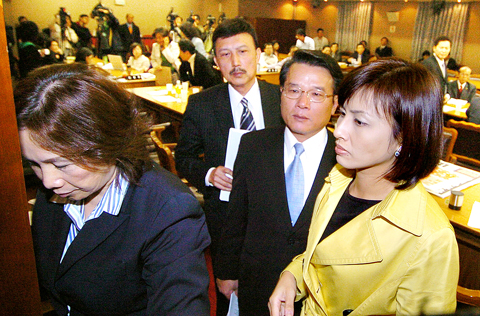Amid heated debate and verbal disputes, the four agreements signed by Straits Exchange Foundation (SEF) Chairman Chiang Pin-kung (江丙坤) and Association for Relations Across the Taiwan Strait Chairman Chen Yunlin (陳雲林) last month passed the Legislative Yuan’s joint committee review yesterday.
During the meeting, Democratic Progressive Party (DPP) lawmakers questioned the legality of some of the clauses contained in the four agreements, which deal with direct cargo links, direct daily passenger transport links, direct mail delivery services and a joint food safety monitoring mechanism.
One of the disputes was over the issue of exemptions from income and business taxes for marine transport companies on revenues from cross-strait cargo services.

PHOTO: LIAO CHEN-HUEI, TAIPEI TIMES
Mainland Affairs Council (MAC) Chairwoman Lai Hsin-yuan (賴幸媛) and Vice Chairman Fu Don-cheng (傅棟成) insisted that the exemptions were legal, but DPP lawmakers challenged that view.
“Any tax breaks — including those for the automobile industry recently proposed by the government — require a revision of the tax laws,” DPP Legislator Tien Chiu-chin (田秋堇) said during a question-and-answer session of a joint meeting of the Internal Administration Committee and the Transportation, Health, Environment and Labor Committee.
“Since when did the SEF become the supreme government agency that can invalidate laws just by signing agreements?” she said.
Fu argued that the Statute Governing the Relations between the People of the Taiwan Area and the Mainland Area (兩岸人民關係條例) states that special treatment may be applied to “taxations, such as tariffs.”
DPP Legislator Chiu Yi-ying (邱議瑩) disagreed.
“This is not how you should interpret the statute,” Chiu said, with other DPP legislators agreeing.
Chinese Nationalist Party (KMT) Legislator Wu Yu-sheng (吳育昇) then accused the DPP of technically attempting to block the agreements.
The situation worsened when KMT legislators Yang Li-huan (楊麗環) and Huang Chao-shun (黃昭順) also expressed opposition to the business tax exemption.
The committee ended up passing the direct cross-strait marine transport agreement conditionally, after promising to launch a further law revision process.
Despite questions raised by the DPP about some of the clauses in the four agreements, the agreements were all eventually passed at the meeting where the KMT held a majority.
The agreements will be sent to the legislature’s General Assembly for approval today.

Chinese Nationalist Party (KMT) Chairman Eric Chu (朱立倫), spokeswoman Yang Chih-yu (楊智伃) and Legislator Hsieh Lung-chieh (謝龍介) would be summoned by police for questioning for leading an illegal assembly on Thursday evening last week, Minister of the Interior Liu Shyh-fang (劉世芳) said today. The three KMT officials led an assembly outside the Taipei City Prosecutors’ Office, a restricted area where public assembly is not allowed, protesting the questioning of several KMT staff and searches of KMT headquarters and offices in a recall petition forgery case. Chu, Yang and Hsieh are all suspected of contravening the Assembly and Parade Act (集會遊行法) by holding

PRAISE: Japanese visitor Takashi Kubota said the Taiwanese temple architecture images showcased in the AI Art Gallery were the most impressive displays he saw Taiwan does not have an official pavilion at the World Expo in Osaka, Japan, because of its diplomatic predicament, but the government-backed Tech World pavilion is drawing interest with its unique recreations of works by Taiwanese artists. The pavilion features an artificial intelligence (AI)-based art gallery showcasing works of famous Taiwanese artists from the Japanese colonial period using innovative technologies. Among its main simulated displays are Eastern gouache paintings by Chen Chin (陳進), Lin Yu-shan (林玉山) and Kuo Hsueh-hu (郭雪湖), who were the three young Taiwanese painters selected for the East Asian Painting exhibition in 1927. Gouache is a water-based

Taiwan would welcome the return of Honduras as a diplomatic ally if its next president decides to make such a move, Minister of Foreign Affairs Lin Chia-lung (林佳龍) said yesterday. “Of course, we would welcome Honduras if they want to restore diplomatic ties with Taiwan after their elections,” Lin said at a meeting of the legislature’s Foreign Affairs and National Defense Committee, when asked to comment on statements made by two of the three Honduran presidential candidates during the presidential campaign in the Central American country. Taiwan is paying close attention to the region as a whole in the wake of a

OFF-TARGET: More than 30,000 participants were expected to take part in the Games next month, but only 6,550 foreign and 19,400 Taiwanese athletes have registered Taipei city councilors yesterday blasted the organizers of next month’s World Masters Games over sudden timetable and venue changes, which they said have caused thousands of participants to back out of the international sporting event, among other organizational issues. They also cited visa delays and political interference by China as reasons many foreign athletes are requesting refunds for the event, to be held from May 17 to 30. Jointly organized by the Taipei and New Taipei City governments, the games have been rocked by numerous controversies since preparations began in 2020. Taipei City Councilor Lin Yen-feng (林延鳳) said yesterday that new measures by